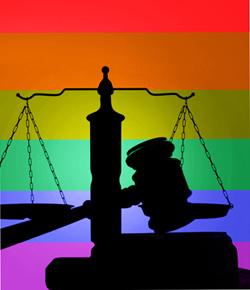Do elected judges have different views on gay rights than appointed judges?

State supreme court judges who are elected are less likely to support gay rights than appointed judges, according to a new study.
The study (PDF) of 127 state supreme court decisions involving LGBT rights issues since 2003 found that judges who were elected in partisan elections supported LGBT rights 53 percent of the time—which was less than judges on the bench as a result of different systems, the New York Times reports in a Sidebar column.
Judges supported LGBT rights 70 percent of the time if elected in nonpartisan elections, 76 percent of the time if they face retention elections, and 82 percent of the time if they are appointed or have life tenure.
The study was commissioned by Lambda Legal and conducted by Chicago-Kent law professor Anthony Michael Kreis. Lambda Legal is a legal defense group for LGBT people and people living with HIV.
Six states use partisan elections to choose state high court judges; 15 states use nonpartisan elections; and in 29 states judges are initially appointed by governors or legislatures, according to the report. After the judges take the bench, they run in partisan elections in 20 states, and they face retention elections in 18 states, the report says.
Other studies have also found a link between elections and decisions. Studies in Pennsylvania and Washington state found judges facing re-election are more likely to impose harsh sentences in serious cases. Another study found that during election years, judges in Alabama were more likely to override life sentences and impose capital punishment.



